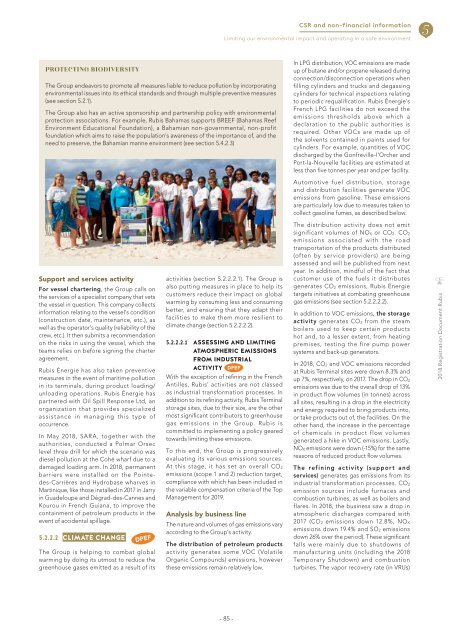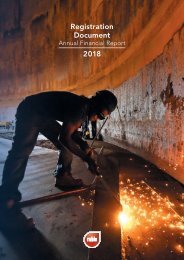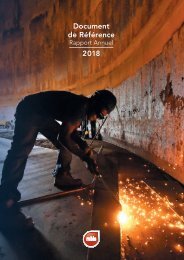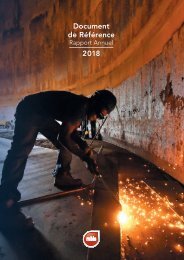Registration Document 2018 Rubis
Create successful ePaper yourself
Turn your PDF publications into a flip-book with our unique Google optimized e-Paper software.
CSR and non-financial information<br />
Limiting our environmental impact and operating in a safe environment<br />
5<br />
PROTECTING BIODIVERSITY<br />
The Group endeavors to promote all measures liable to reduce pollution by incorporating<br />
environmental issues into its ethical standards and through multiple preventive measures<br />
(see section 5.2.1).<br />
The Group also has an active sponsorship and partnership policy with environmental<br />
protection associations. For example, <strong>Rubis</strong> Bahamas supports BREEF (Bahamas Reef<br />
Environment Educational Foundation), a Bahamian non-governmental, non-profit<br />
foundation which aims to raise the population’s awareness of the importance of, and the<br />
need to preserve, the Bahamian marine environment (see section 5.4.2.3)<br />
In LPG distribution, VOC emissions are made<br />
up of butane and/or propane released during<br />
connection/disconnection operations when<br />
filling cylinders and trucks and degassing<br />
cylinders for technical inspections relating<br />
to periodic requalification. <strong>Rubis</strong> Énergie’s<br />
French LPG facilities do not exceed the<br />
emissions thresholds above which a<br />
declaration to the public authorities is<br />
required. Other VOCs are made up of<br />
the solvents contained in paints used for<br />
cylinders. For example, quantities of VOC<br />
discharged by the Gonfreville-l’Orcher and<br />
Port-la-Nouvelle facilities are estimated at<br />
less than five tonnes per year and per facility.<br />
Automotive fuel distribution, storage<br />
and distribution facilities generate VOC<br />
emissions from gasoline. These emissions<br />
are particularly low due to measures taken to<br />
collect gasoline fumes, as described below.<br />
Support and services activity<br />
For vessel chartering, the Group calls on<br />
the services of a specialist company that vets<br />
the vessel in question. This company collects<br />
information relating to the vessel’s condition<br />
(construction date, maintenance, etc.), as<br />
well as the operator’s quality (reliability of the<br />
crew, etc.). It then submits a recommendation<br />
on the risks in using the vessel, which the<br />
teams relies on before signing the charter<br />
agreement.<br />
<strong>Rubis</strong> Énergie has also taken preventive<br />
measures in the event of maritime pollution<br />
in its terminals, during product loading/<br />
unloading operations. <strong>Rubis</strong> Énergie has<br />
partnered with Oil Spill Response Ltd, an<br />
organization that provides specialized<br />
assistance in managing this type of<br />
occurrence.<br />
In May <strong>2018</strong>, SARA, together with the<br />
authorities, conducted a Polmar Orsec<br />
level three drill for which the scenario was<br />
diesel pollution at the Cohé wharf due to a<br />
damaged loading arm. In <strong>2018</strong>, permanent<br />
barriers were installed on the Pointedes-Carrières<br />
and Hydrobase wharves in<br />
Martinique, like those installed in 2017 in Jarry<br />
in Guadeloupe and Dégrad-des-Cannes and<br />
Kourou in French Guiana, to improve the<br />
containment of petroleum products in the<br />
event of accidental spillage.<br />
5.2.2.2 CLIMATE CHANGE<br />
DPEF<br />
The Group is helping to combat global<br />
warming by doing its utmost to reduce the<br />
greenhouse gases emitted as a result of its<br />
activities (section 5.2.2.2.1). The Group is<br />
also putting measures in place to help its<br />
customers reduce their impact on global<br />
warming by consuming less and consuming<br />
better, and ensuring that they adapt their<br />
facilities to make them more resilient to<br />
climate change (section 5.2.2.2.2).<br />
5.2.2.2.1 ASSESSING AND LIMITING<br />
ATMOSPHERIC EMISSIONS<br />
FROM INDUSTRIAL<br />
ACTIVITY DPEF<br />
With the exception of refi ning in the French<br />
Antilles, <strong>Rubis</strong>’ activities are not classed<br />
as industrial transformation processes. In<br />
addition to its refining activity, <strong>Rubis</strong> Terminal<br />
storage sites, due to their size, are the other<br />
most signifi cant contributors to greenhouse<br />
gas emissions in the Group. <strong>Rubis</strong> is<br />
committed to implementing a policy geared<br />
towards limiting these emissions.<br />
To this end, the Group is progressively<br />
evaluating its various emissions sources.<br />
At this stage, it has set an overall CO 2<br />
emissions (scope 1 and 2) reduction target,<br />
compliance with which has been included in<br />
the variable compensation criteria of the Top<br />
Management for 2019.<br />
Analysis by business line<br />
The nature and volumes of gas emissions vary<br />
according to the Group’s activity.<br />
The distribution of petroleum products<br />
activity generates some VOC (Volatile<br />
Organic Compounds) emissions, however<br />
these emissions remain relatively low.<br />
The distribution activity does not emit<br />
significant volumes of NO X or CO 2. CO 2<br />
emissions associated with the road<br />
transportation of the products distributed<br />
(often by service providers) are being<br />
assessed and will be published from next<br />
year. In addition, mindful of the fact that<br />
customer use of the fuels it distributes<br />
generates CO 2 emissions, <strong>Rubis</strong> Énergie<br />
targets initiatives at combating greenhouse<br />
gas emissions (see section 5.2.2.2.2).<br />
In addition to VOC emissions, the storage<br />
activity generates CO 2 from the steam<br />
boilers used to keep certain products<br />
hot and, to a lesser extent, from heating<br />
premises, testing the fire pump power<br />
systems and back-up generators.<br />
In <strong>2018</strong>, CO 2 and VOC emissions recorded<br />
at <strong>Rubis</strong> Terminal sites were down 8.3% and<br />
up 7%, respectively, on 2017. The drop in CO 2<br />
emissions was due to the overall drop of 13%<br />
in product flow volumes (in tonnes) across<br />
all sites, resulting in a drop in the electricity<br />
and energy required to bring products into,<br />
or take products out of, the facilities. On the<br />
other hand, the increase in the percentage<br />
of chemicals in product flow volumes<br />
generated a hike in VOC emissions. Lastly,<br />
NO X emissions were down (-15%) for the same<br />
reasons of reduced product flow volumes.<br />
The refining activity (support and<br />
services) generates gas emissions from its<br />
industrial transformation processes. CO 2<br />
emission sources include furnaces and<br />
combustion turbines, as well as boilers and<br />
flares. In <strong>2018</strong>, the business saw a drop in<br />
atmospheric discharges compared with<br />
2017 (CO 2 emissions down 12.8%, NO X<br />
emissions down 19.4% and SO 2 emissions<br />
down 26% over the period). These significant<br />
falls were mainly due to shutdowns of<br />
manufacturing units (including the <strong>2018</strong><br />
Temporary Shutdown) and combustion<br />
turbines. The vapor recovery rate (in VRUs)<br />
<strong>2018</strong> <strong>Registration</strong> <strong>Document</strong> <strong>Rubis</strong><br />
- 85 -





